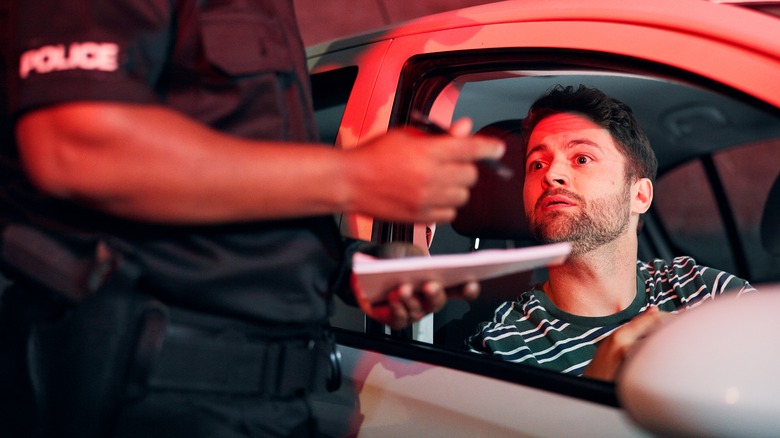Everything That Cops See When They Run Your Plates
Police officers may run your car's license plate without you knowing it, and that is perfectly fine since it's considered public information. However, whether an officer has a reason to pull you over after that largely depends on the data they find in their database. Unlike a vehicle identification number (VIN) that conveys information about the production, make, and engine of a vehicle, a license plate gives more detailed information about a car's registration and use. Unless you have a personalized vanity plate, you're most likely among the majority of car owners driving around with standard plates.
When law enforcement officers run standard license plates, the first thing they see is information related to the vehicle, including its make, model, color, and year of release. The details on file must match the current appearance of the car to prevent any suspicion of questionable activity from the police. The database will also show information about the vehicle's registered owner and its registration status. They may even get some help from AI to track license plates on any given day. Driving a car not registered with the local Department of Motor Vehicles (DMV) may lead to a traffic citation and penalties. In most states, license plates are renewed annually or biennially. Only Delaware issues permanent licenses that do not require renewal and remain active for as long as the registration of the vehicle is maintained.
Information police officers see when they run your plate
When an officer runs your plate, they can access information about your driving history, including any traffic violations, tickets, or accidents. They'll even find out if you have an outstanding search warrant or if the vehicle you're driving has been reported stolen. The details of these violations can be very specific, indicating the date, location, and the nature of the infraction, as well as any associated fines and penalties. The database may also include details about the driver's past convictions and relevant criminal history. In some states, like Michigan, cops may be able to determine whether a car has insurance or if the policy has expired.
The information the authorities can retrieve by running your license plate varies from state to state. Don't be surprised if officers pull you over to double-check your car's registration. This might be the only time you're asked to do so if you have a clean driving history. For the most part, license plates have become a mundane car accessory that car owners only get because they are required to by law. That's why you might want to keep your license plate clean to make sure its numbers are visible and easy to read.

